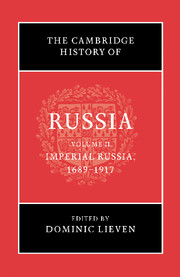Book contents
- Frontmatter
- Introduction
- Part I Empire
- Part II Culture, Ideas, Identities
- Part III Non-Russian Nationalities
- Part IV Russian Society, Law and Economy
- 11 The elites
- 12 The groups between: raznochintsy, intelligentsia, professionals
- 13 Nizhnii Novgorod in the nineteenth century: portrait of a city
- 14 Russian Orthodoxy: Church, people and politics in Imperial Russia
- 15 Women, the family and public life
- 16 Gender and the legal order in Imperial Russia
- 17 Law, the judicial system and the legal profession
- 18 Peasants and agriculture
- 19 The Russian economy and banking system
- Part V Government
- Part VI Foreign Policy and the Armed Forces
- Part VII Reform, War and Revolution
- Bibliography
- Index
- Map 5. The Russian Empire (1913). From Archie Brown, Michael Kaser, and G. S. Smith (eds.) Cambridge Encyclopedia of Russia 1982.">
- Plate Section">
- References
15 - Women, the family and public life
from Part IV - Russian Society, Law and Economy
Published online by Cambridge University Press: 28 March 2008
- Frontmatter
- Introduction
- Part I Empire
- Part II Culture, Ideas, Identities
- Part III Non-Russian Nationalities
- Part IV Russian Society, Law and Economy
- 11 The elites
- 12 The groups between: raznochintsy, intelligentsia, professionals
- 13 Nizhnii Novgorod in the nineteenth century: portrait of a city
- 14 Russian Orthodoxy: Church, people and politics in Imperial Russia
- 15 Women, the family and public life
- 16 Gender and the legal order in Imperial Russia
- 17 Law, the judicial system and the legal profession
- 18 Peasants and agriculture
- 19 The Russian economy and banking system
- Part V Government
- Part VI Foreign Policy and the Armed Forces
- Part VII Reform, War and Revolution
- Bibliography
- Index
- Map 5. The Russian Empire (1913). From Archie Brown, Michael Kaser, and G. S. Smith (eds.) Cambridge Encyclopedia of Russia 1982.">
- Plate Section">
- References
Summary
It is difficult to generalise about the women of Russia, so much did their identity and experience vary according to their legally defined social status, religion and ethnicity, among other variables. To be sure, gender shaped key aspects of women’s lives. Until well into the nineteenth century, if not later, most shared virtually an identical lot in life: learning women’s duties at their mother’s knee, a marriage arranged by others, then childbearing, childrearing and the labour of maintaining the home and provisioning the family. Changes that began in the reign of Peter the Great nevertheless affected the ways that women understood and fulfilled those family responsibilities; while developments in the final decades of the nineteenth century challenged the family order that governed most women’s lives, and expanded and diversified alternative ways of living. Even so, beneath the developments traced in this chapter, fundamental continuities remained.
The Petrine revolution and its consequences
The period properly begins with the reign of Peter the Great, who brought a thoroughgoing revolution to aristocratic women’s lives and initiated economic, social and legal changes that touched the lives of many of the rest. As part of his Westernising project, and in order to mobilise his subjects to suit his needs, Peter the Great endeavoured to transform Russia’s traditional family regime. From the elites, he required new women, suitable consorts for the new men of the service elite and likewise modelled along Western lines. ‘Upper-class Muscovite women were driven from the seclusion of the terem, or women’s quarters, divested of their old-fashioned robes, squeezed into Western corsets and low-cut gowns and transformed into suitable companions for their “decent beardless” spouses.’
- Type
- Chapter
- Information
- The Cambridge History of Russia , pp. 306 - 325Publisher: Cambridge University PressPrint publication year: 2006
References
- 1
- Cited by



